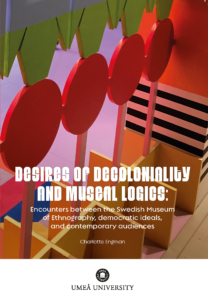DEADLINE EXTENDED TO 15 MAY 2023
The 12th International Conference of Young Folklorists
Beyond the Field: Fieldwork in the 21st Century
September 13–15, 2023, Riga, Latvia
Folklore studies have relied on firsthand encounters as a source of data since the 19th century when the first folklorists set out to collect oral lore from European peasantry. Since then, the discipline and the ways of human communication have changed tremendously; however, even in today’s digital environment, communication between folklore scholars and their informants has not lost its importance. Reflexivity has become an integral part of the discipline and the ethical principles of fieldwork have advanced considerably. The power relations in fieldwork have been transformed by applying collaborative ethnography as a methodological framework. Thus, folk performers are not seen as a mere source of information, but rather as fieldwork collaborators and co-creators of knowledge. The practical aspect of fieldwork has developed alongside technological advancements allowing the folklore collectors to capture their informants on various media.
Moreover, the proliferation of digital technologies, social media platforms, and other virtual spaces of the 21st century have inevitably modified how we define ’the field’ itself. The global Covid-19 pandemic made researchers adapt to online interactions as the key form of communication, since the mobility of researchers was limited. The devastating Russian invasion of Ukraine has suspended fieldwork, disrupted research, and brought the future into uncertainty and precariousness for many. This poses the challenges of fieldwork during warfare and socio-political crises, questioning the ethical responsibilities that come with it.
Despite the constantly changing world around us, folklore scholars still prefer the firsthand observation of informants and communities in their habitats and documentation of their knowledge as the main research method. The 12th International Conference of Young Folklorists welcomes proposals for papers on various fieldwork-related topics. Potential themes include but are not limited to the following subject areas:
– Historical perspectives and contexts of the fieldwork-based data collection;
– Fieldwork materials in folklore archives;
– Emotions, body, and fieldwork;
– Fieldwork at the time of crisis and unstable political contexts;
– Landscape and fieldwork: cultural heritage and the Anthropocene;
– Posthuman approaches and other-than-human interaction in the field;
– Feminist and queer ethnography;
– Ethical challenges of documenting sensitive and controversial data;
– Professional responsibility: informed consent and representation;
– Challenges and opportunities of digital ethnography and working in the virtual field;
– Managing intersectional identities in at-home ethnography;
– Scholars and community: the power dynamics of the fieldwork.
Since fieldwork as a method is relevant not only in folklore studies, but also in anthropology, oral history, cultural heritage studies, and other related disciplines, participants from other fields are also welcome to join the conference.
The working language of the conference is English. Please submit abstracts of 350 words, along with your name, institutional affiliation, email, and a brief biographical note (2–3 sentences) to the conference email rigayofo(@)gmail.com.
The deadline for the abstracts is 1 May 2023 (extended to 15 May). Notifications of acceptance will be sent out by 1 June 2023. There is no conference fee, but participants are expected to cover their travel and accommodation expenses.
The conference is organized by the Archives of Latvian Folklore, Institute of Literature, Folklore and Art, and will be held at the National Library of Latvia
